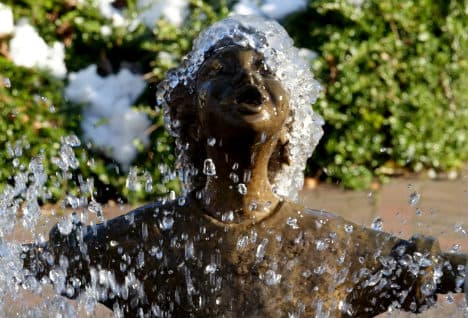Nine stunning pictures of Germany's freezing weekend

Clear blue skies, heavy frosts, and coverings of snow: winter has arrived in Germany in all but name. Here are some of the most breathtaking photos from the last couple of days.
 Photo: DPA
Photo: DPA
In the Taunus mountain range north of Frankfurt in Hesse, one man dusted off his cross-country skis on Saturday, and took to the snowy fields.
 Photo: DPA
Photo: DPA
On Germany's Riedbergpass in Bavaria - Germany's highest mountain pass, peaking at 1,407 metres above sea level - a car and bus shelter in Balderschwang were fully snowed in.
 Photo: DPA
Photo: DPA
Most of the north of Germany stayed snow-free, but across the country people awoke to a thick frost, and to beautiful winter sunrises. Here in the Oder-Spree area of Brandenburg, Patrick Pleul captured the sunrise over a wind turbine farm near Sieversdorf.
 Photo: DPA
Photo: DPA
The wide open skies provided photo opportunities across Germany. Here Bernd Thissen snapped the early Monday morning frost on a hill near the Phoenix reservoir in Dortmund, North Rhine-Westphalia.
 Photo: DPA
Photo: DPA
The frost was so heavy in parts of Germany, such as near Mühlen-Eichsen, in Mecklenburg-Western Pomerania, where it crystallized the branches of the trees lining the road on Sunday morning.
 Photo: DPA
Photo: DPA
Many also made the trip on Sunday morning up to the Brocken, the highest peak in the Harz mountain range in Saxony-Anhalt at 1,141 metres of altitude.
Although considerably lower than the Alpine peaks, northern Germany's highest mountain top had a covering of 21 centimetres of snow and temperatures of minus seven degrees.
 Photo: DPA
Photo: DPA
Patrick Pleul also captured the beautiful, frosted colours of a tree line with a drone camera in Brandenburg.
 Photo: DPA
Photo: DPA
The cold weather continued into the new week. In Lunenburg in Lower Saxony, a fountain statue gained an ice cap on Monday morning.
 Photo: DPA
Photo: DPA
Catching the early morning sun on Monday, one jogger was photographed running through the Tiergarten park in central Berlin.
After a clear and cold Monday, the weather is set to get wetter and warmer during the rest of the week.
p.p1 {margin: 0.0px 0.0px 0.0px 0.0px; font: 12.0px 'Helvetica Neue'; color: #454545}
Comments
See Also
 Photo: DPA
Photo: DPA
In the Taunus mountain range north of Frankfurt in Hesse, one man dusted off his cross-country skis on Saturday, and took to the snowy fields.
 Photo: DPA
Photo: DPA
On Germany's Riedbergpass in Bavaria - Germany's highest mountain pass, peaking at 1,407 metres above sea level - a car and bus shelter in Balderschwang were fully snowed in.
 Photo: DPA
Photo: DPA
Most of the north of Germany stayed snow-free, but across the country people awoke to a thick frost, and to beautiful winter sunrises. Here in the Oder-Spree area of Brandenburg, Patrick Pleul captured the sunrise over a wind turbine farm near Sieversdorf.
 Photo: DPA
Photo: DPA
The wide open skies provided photo opportunities across Germany. Here Bernd Thissen snapped the early Monday morning frost on a hill near the Phoenix reservoir in Dortmund, North Rhine-Westphalia.
 Photo: DPA
Photo: DPAThe frost was so heavy in parts of Germany, such as near Mühlen-Eichsen, in Mecklenburg-Western Pomerania, where it crystallized the branches of the trees lining the road on Sunday morning.
 Photo: DPA
Photo: DPA
Many also made the trip on Sunday morning up to the Brocken, the highest peak in the Harz mountain range in Saxony-Anhalt at 1,141 metres of altitude.
Although considerably lower than the Alpine peaks, northern Germany's highest mountain top had a covering of 21 centimetres of snow and temperatures of minus seven degrees.
 Photo: DPA
Photo: DPA
Patrick Pleul also captured the beautiful, frosted colours of a tree line with a drone camera in Brandenburg.
 Photo: DPA
Photo: DPA
The cold weather continued into the new week. In Lunenburg in Lower Saxony, a fountain statue gained an ice cap on Monday morning.
 Photo: DPA
Photo: DPA
Catching the early morning sun on Monday, one jogger was photographed running through the Tiergarten park in central Berlin.
After a clear and cold Monday, the weather is set to get wetter and warmer during the rest of the week.
p.p1 {margin: 0.0px 0.0px 0.0px 0.0px; font: 12.0px 'Helvetica Neue'; color: #454545}
Join the conversation in our comments section below. Share your own views and experience and if you have a question or suggestion for our journalists then email us at [email protected].
Please keep comments civil, constructive and on topic – and make sure to read our terms of use before getting involved.
Please log in here to leave a comment.